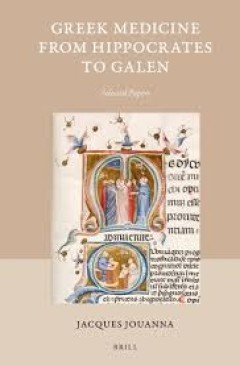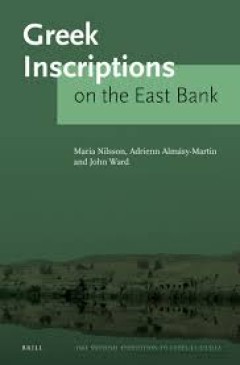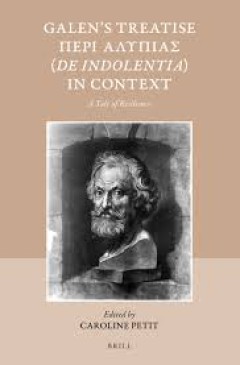Filter by

Urban Rituals in Sacred Landscapes in Hellenistic Asia Minor
In Urban Rituals in Sacred Landscapes in Hellenistic Asia Minor, Christina G. Williamson examines the phenomenon of monumental sanctuaries in the countryside of Asia Minor that accompanied the second rise of the Greek city-state in the Hellenistic period. Moving beyond monolithic categories, Williamson provides a transdisciplinary frame of analysis that takes into account the complex local hist…
- Edition
- -
- ISBN/ISSN
- 9789004461277
- Collation
- 540 hlm; ill., lamp.,
- Series Title
- Religions in the Graeco-Roman World, Volume: 196
- Call Number
- -

Left-Dislocation in Latin : Topics and Syntax in Republican Texts
Now available in Open Access thanks to the support of the University of Helsinki. In the construction known as left-dislocation, an element appears in a fronted position, before the clause to which it belongs, usually introducing the topic of the sentence. Based on a detailed analysis of syntax, information structure and pragmatic organization, this study explores how left-dislocation is used i…
- Edition
- -
- ISBN/ISSN
- 978-90-04-35746-4
- Collation
- x, 253 pp.
- Series Title
- Amsterdam Studies in Classical Philology, Volume: 28
- Call Number
- -

Lateinische Dialoge 1200-1400 : Literaturhistorische Studie und Repertorium
The Middle Ages produced a very considerable corpus of latin dialogues but until now a study of this group of texts was missing. In this monograph, the complete dialogue production of the years 1200-1400 (119 works, many of them still unedited) is explored and presented in a detailed repertory which gives title(s), incipit and explicit as well as information on author, date, textual transmissio…
- Edition
- -
- ISBN/ISSN
- 978-90-47-42063-7
- Collation
- xxx, 826 pp.
- Series Title
- Mittellateinische Studien und Texte, Volume: 37
- Call Number
- -

Inventing Origins? Aetiological Thinking in Greek and Roman Antiquity
Aetiologies seem to gratify the human desire to understand the origin of a phenomenon. However, as this book demonstrates, aetiologies do not exclusively explore origins. Rather, in inventing origin stories they authorise the present and try to shape the future. This book explores aetiology as a tool for thinking, and draws attention to the paradoxical structure of origin stories. Aetiologies r…
- Edition
- -
- ISBN/ISSN
- 978-90-04-50043-3
- Collation
- -
- Series Title
- Euhormos: Greco-Roman Studies in Anchoring Innovation, Volume: 2
- Call Number
- -

Integration in Rome and in the Roman World : Proceedings of the Tenth Worksho…
Integration in the empire under the political control of the city of Rome, her princeps, and the different authorities in the provinces and cities includes processes of inclusion and exclusion. These multifaceted processes take place at various levels in society and at different places, over a long period of time. In this volume, these processes are analysed and reflected on from different pers…
- Edition
- -
- ISBN/ISSN
- 978-90-04-25667-5
- Collation
- -
- Series Title
- Impact of Empire, Volume: 17
- Call Number
- -

Greek Medicine from Hippocrates to Galen : Selected Papers
This volume makes available for the first time in English translation a selection of Jacques Jouanna's papers on medicine in the Graeco-Roman world. The papers cover more than thirty years of Jouanna’s scholarship and range from the early beginnings of Greek medicine to late antiquity. Part One studies the ways in which Greek medicine is related to its historical and cultural background (poli…
- Edition
- -
- ISBN/ISSN
- 978-90-04-23254-9
- Collation
- -
- Series Title
- Studies in Ancient Medicine, Volume: 40
- Call Number
- -

Greek Inscriptions on the East Bank
For the first time, this book presents the complete collection of Greek inscriptions of Gebel el-Silsila East – Ancient Egypt’s largest and most important sandstone quarry, including lists of names and professions of individuals involved in the quarry expeditions. The inscriptions are described, illustrated and analysed and placed within their archaeological context based on careful documen…
- Edition
- -
- ISBN/ISSN
- 978-90-04-54069-9
- Collation
- xvi, 356 pp
- Series Title
- The Swedish Expedition to Gebel el-Silsila, Volume: 1
- Call Number
- -

Genre in Archaic and Classical Greek Poetry: Theories and Models : Studies in…
Genre in Archaic and Classical Greek Poetry foregrounds innovative approaches to the question of genre, what it means, and how to think about it for ancient Greek poetry and performance. Embracing multiple definitions of genre and lyric, the volume pushes beyond current dominant trends within the field of Classics to engage with a variety of other disciplines, theories, and models. Eleven paper…
- Edition
- -
- ISBN/ISSN
- 978-90-04-41259-0
- Collation
- xiv, 408
- Series Title
- Mnemosyne, Supplements, Volume: 428
- Call Number
- -

Galen's Treatise Περὶ Ἀλυπίας (De indolentia) in Context : A Tal…
This collective volume arises from a Wellcome-funded conference held at the University of Warwick in 2014 about the “new” Galen discovered in 2005 in a Greek manuscript, De indolentia. In the wake of the latest English translation published by Vivian Nutton in 2013, this book offers a multi-disciplinary approach to the new text, discussing in turn issues around Galen’s literary production…
- Edition
- -
- ISBN/ISSN
- 978-90-04-38330-2
- Collation
- vi + 296 pp
- Series Title
- Studies in Ancient Medicine, Volume: 52
- Call Number
- -

Frontiers in the Roman World : Proceedings of the Ninth Workshop of the Inter…
This volume presents the proceedings of the ninth workshop of the international network ‘Impact of Empire’, which concentrates on the history of the Roman Empire and brings together ancient historians, archaeologists, classicists and specialists on Roman law from some thirty European, North American and Australian universities. This volume focuses on different ways in which the Roman Empire…
- Edition
- -
- ISBN/ISSN
- 978-90-04-21503-0
- Collation
- -
- Series Title
- Impact of Empire, Volume: 13
- Call Number
- -
 Computer Science, Information & General Works
Computer Science, Information & General Works  Philosophy & Psychology
Philosophy & Psychology  Religion
Religion  Social Sciences
Social Sciences  Language
Language  Pure Science
Pure Science  Applied Sciences
Applied Sciences  Art & Recreation
Art & Recreation  Literature
Literature  History & Geography
History & Geography